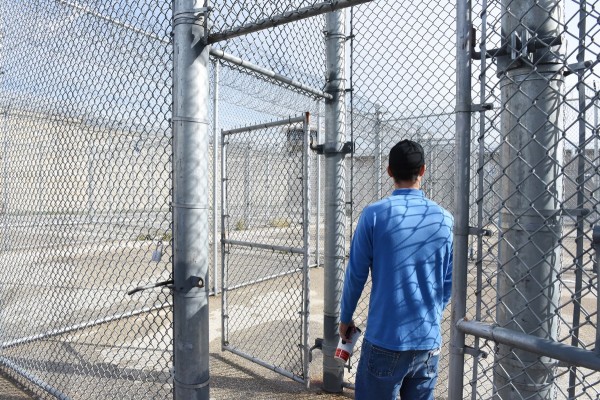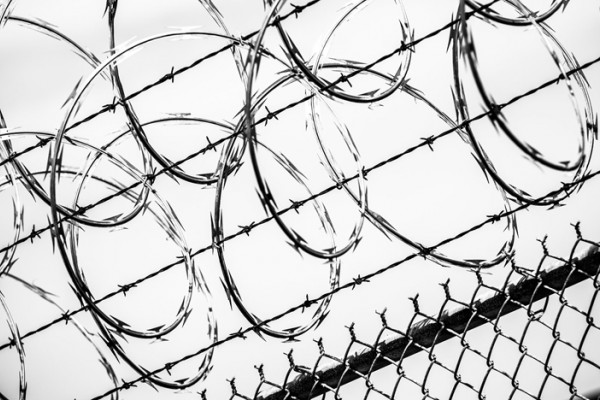“If you have come here to help me ...”
Why Women Are in Canadian Prisons
I want to start by honouring those women who have lived the experience about which I presume to speak.
Women are the fastest-growing prison population world-wide. This is not accidental. Canada has been one of the first countries to be impacted by the now-globalized capitalist laws and policies that facilitate the desire for cash and products. These policies are destroying our social-safety nets - from social and health services to economic and education standards and availability. As we have recognized very concretely by the change of our mission, these laws and policies are increasingly coming into conflict with peoples’ lives.
The result is the virtual inevitability of criminalization. For example, by creating extremely low welfare rates, the government has ensured that many poor people are relegated to the criminalized underclass. In their efforts to survive, poor people are resorting to welfare fraud, prostitution, drug trafficking, or whatever survival strategies they need to provide food for themselves and their families. However, if the government were truly interested in tackling the issue of fraudulent transactions that cause harm to its citizens, it would be prosecuting those bureaucrats, members of Parliament, welfare officers and police officers who craft, pass and enforce the laws and policies that cause this situation.
Causing Suffering, Criminalizing Poverty
It is these laws and policies that are causing human suffering. It is these laws and policies that effectively criminalize poverty, disabilities and resistance to colonization. It is these bureaucrats, parliamentarians, welfare and police officers, as well as their friends in the universities who come along and develop classification schemes, methods of assessment and correction tools. These are the folks pretending that the poor people who have been grabbed, sucked, or thrown into the criminal and correctional systems are there because of their own wishes and will power.
As anyone with an ounce of sense can see, poor people are not the cause of the greatest risks to others. And yet, the powers-that-be continue to perpetuate the myth that they are. These are the folks who like to focus on things like risk assessments and correctional programs. But it ought to be those responsible for, or complicit in, the destruction of our social-safety net that get corrected!
In the United Kingdom, noted policy leaders like Pat Carlen and the Howard League are amongst those calling for emptying the prisons and reinvesting in society. I recommend that you all go out and read Angela Davis’ book, Are Prisons Obsolete? Angela and others have characterized the push to criminalize the most dispossessed as the present manifestation of race, ability, class and gender bias. What Angela and others have argued is that we need to examine our fundamental beliefs and notions of whose interests and biases are truly privileged. Because the fact of the matter is that it is not poor people and prisoners!
It seems quite ludicrous to say to women and girls not to take drugs to dull the pain of abuse, hunger, or other devastation. It seems ludicrous to tell them that they must stop the behaviour that allows them to survive poverty, abuse and disabilities. It seems ludicrous until we actually start to change the situation these women and girls are faced with. What should we say to truly help women and girls who have no current or prospect of any income, housing, medical, educational, or other supports?
We have to recognize that it is futile to release women and girls to the street with little more than psycho-social, cognitive-skill, or drug-abstinence programming. We have to recognize that it is wrong to believe that these women and girls are in control of, and therefore responsible for, their desperate situations. Or to suggest that they are the ones who have caused their own criminalization. We have to absolutely reject and resist such notions.
In 1996, the federal government eliminated the Canada Assistance Plan. In doing this, it eliminated proper Canadian standards of social, medical and educational resourcing. After these cuts took effect, we experienced all kinds of knee-jerk and band-aid responses. However, all of these responses - crime-prevention programs, campaigns against homelessness, ideas about restorative justice - presume criminality. They therefore perpetuate the problems.
What would happen if, instead of this kind of response, we decided to ensure that every prisoner learned about the history of the use of criminal law to colonize Aboriginal peoples? What would happen if all prisoners understood that this was done to separate Aboriginal peoples from their land and culture? What if prisoners learned the real history of the criminalization of the indigent and homeless through laws prohibiting vagrancy and night walking?
Really Saying Something
What if, instead of talking endlessly about the supposed crimes of the poor, we instead tried highlighting the way the mass media regularly fails to condemn abuses of power and force by police and prison personnel and neglects institutionalized persons? What would happen if we chose to reject current theories of crime and criminality and instead focused on trying to prevent - and when unsuccessful punish - those who perpetrate the most harmful behaviours?
We are talking here about those who wage war, those who hoard essential goods, those who make excess profits, or irresponsibly and negligently handle toxic cargos, those who commit crimes against social harmony, economic and even governmental order. What would the system look like if we prosecuted and sentenced people for lying while running for office or stuck handcuffs on those who wrongfully used or accessed government power and public resources?
Too many of us spend our time vibrating between rage and despair as we strive to act in ways that will directly benefit and make change for the most oppressed. Let’s use that anger to fuel our action. But let’s not stop there! Let’s also remember to celebrate our resisters and revolutionary thinkers and doers.
If we begin to do this, the picture might begin to look a little different.
For example, we might focus on the Aboriginal women who have taken our federal government to the United Nations, forcing them to look past the rhetoric of official reports into the reasons Canada has dropped from number one to something like number seven in the world ratings of citizen standard of living.
Other areas we would focus on and celebrate include the workers who led the 1919 Winnipeg General Strike and other labour leaders who helped bring us our work weeks - and, more importantly, our weekends! We should toast the working-class feminist organizers who insisted that women and children no longer be considered the property of the men who sired or married them, who insisted that violence against women and children must no longer be tolerated, while hiding those same women from the men who tried to kill them and their kids.
Following the Leaders
We should follow the lead of our leaders. Leaders like the young people who demand that we fight globalization and capitalism; or the students in Quebec who went on strike this past year to fight the increased privatization of prisons, health care and education and corresponding cuts to public funding of these essential services; or the young people of our First Nations who blockade highways and logging roads to draw attention to the rape of the land; or all those who have led the struggle to demand that Canada honour its pledge to Aboriginal women and who demanded to know what had happened to and who was responsible for the more-than-500 missing and murdered Aboriginal women in Canada.
We should also honour the lawyers, who were sued and censured by their colleagues and who nearly lost their livelihood when they labeled the racism of police officers who strip-searched three 12-year-old schoolgirls. We should similarly highlight the actions of Corinne Sparks, the Afro-Nova Scotian judge who took judicial notice of the racism of police.
There are many youth, men and especially women prisoners who refuse to succumb, who will not stand down, but instead walk with their sisters inside - like those who courageously authorized the release to the media of the so-called April, 1994 incident, when women were illegally stripped, shackled, transferred to a men’s prison and then held for nine months in isolation.
It is the responsibility of each and every one of us to refuse to collude. It is always in our collective interest when the oppressed rise up to challenge their oppressors and their oppression. Increasing prisoner access to the justice and equality of social inclusion will benefit all of us, and all of our communities.
Even if the system continues to jail the resistor, the system will not be successful in stopping our resistance!
As the saying goes, if you are not outraged, you’re not paying attention. If we become complacent, if we accept the status quo, if we do not daily challenge our paycheques - those of us who have them - and all of our other privileges, then we should do something else.
As Lilla Watson, an Aboriginal woman in Australia has stressed, we need to work together to correct current injustices. She said:
If you have come here to help me,
you are wasting our time.
If you have come here because your liberation is bound up with mine,
then let us work together.
This article appeared in the March/April 2006 issue of Canadian Dimension (Women Speaking Out).










